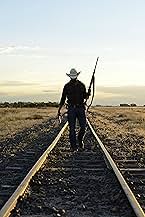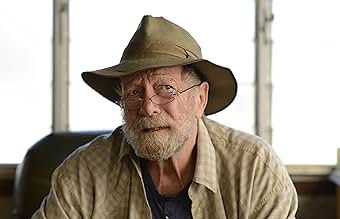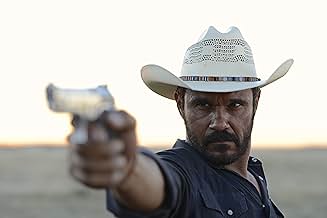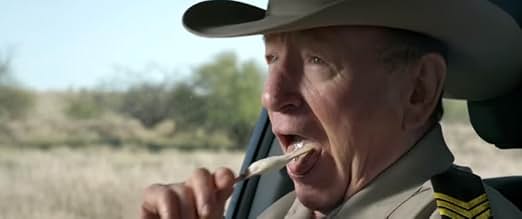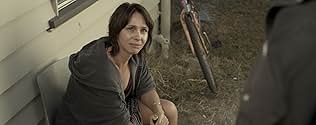Un detective indígena regresa al Outback para investigar el asesinato de una joven.Un detective indígena regresa al Outback para investigar el asesinato de una joven.Un detective indígena regresa al Outback para investigar el asesinato de una joven.
- Dirección
- Guionista
- Elenco
- Premios
- 9 premios ganados y 16 nominaciones en total
- Dirección
- Guionista
- Todo el elenco y el equipo
- Producción, taquilla y más en IMDbPro
Opiniones destacadas
As usual with most Australian films, the story line is very different. The casualness of the style with the weight of the film being presented by the vision, missed telling me what was happening a couple of times. Left the cinema still answering the questions asked. Did feel I needed a bit more in the way of answers given to me though. Acting was excellent , very quickly lost my expectation of known characters roles & embraced the new story rapidly. The structure of town, people & their lives were simply & beautifully presented. The use of aerials helped cement characters & culture of small outback town wonderfully, as did the simple style of presenting different cultural landscapes within the one time. Great movie, will be watching again
The negative reviews baffled me and the positive ones can't do Mystery Road enough justice.
From the opening until the dramatic end, the movie is a captivating tour de force. Coming from the U.S. I'm completely ignorant of the racial biases apparently at play in the Australian Outback, and this film subtly puts them on display without having them become overbearing or preachy.
The acting is tops and Aaron Pederson does his subject well, playing him with confidence and understatement. Hugo Weaving's turn as Johnno is also a well-crafted part, not to mention all of the minor roles, all of which came across as completely believable. It's easy to say the Australian landscape had just as large a role as any of the cast, and it read its lines perfectly.
Although there were a few parts where I found it difficult to understand what was said as a result of the local accent, there was no missing the message that was delivered. Again, from beginning to end the movie hit all the right notes, and even its climatic ending delivered a superbly satisfying denouement to the whole.
I've come to appreciate films not produced in the U.S. because they all too often are so formulaic with shallowly cast characters. Mystery Road represents among the best of what I look for in a movie produced anywhere and is tops among such "foreign" films. It is definitely one to catch.
From the opening until the dramatic end, the movie is a captivating tour de force. Coming from the U.S. I'm completely ignorant of the racial biases apparently at play in the Australian Outback, and this film subtly puts them on display without having them become overbearing or preachy.
The acting is tops and Aaron Pederson does his subject well, playing him with confidence and understatement. Hugo Weaving's turn as Johnno is also a well-crafted part, not to mention all of the minor roles, all of which came across as completely believable. It's easy to say the Australian landscape had just as large a role as any of the cast, and it read its lines perfectly.
Although there were a few parts where I found it difficult to understand what was said as a result of the local accent, there was no missing the message that was delivered. Again, from beginning to end the movie hit all the right notes, and even its climatic ending delivered a superbly satisfying denouement to the whole.
I've come to appreciate films not produced in the U.S. because they all too often are so formulaic with shallowly cast characters. Mystery Road represents among the best of what I look for in a movie produced anywhere and is tops among such "foreign" films. It is definitely one to catch.
There is much to commend in this outback-set crime drama from director, writer and cinematographer, Ivan Sen.
The first scene sets up the whole film most deftly: its depiction of the magnitude of the land at sunset coupled with the place name, Massacre Creek, instantly makes it clear that the vastness of the Australian terrain and inglorious, largely unrepented historic events will frame what follows.
Aaron Pedersen plays the police detective Jay Swan, an Aboriginal returning from 'the city' to his small and extremely isolated home town after a 10 year absence. He is estranged from his former wife, now an alcoholic making a hash of raising their daughter, and also the community in which he was raised. Not fully accepted by the white community either, he is the classic outsider forced to go it alone.
Swan is assigned to the case of a murdered Aboriginal teenage girl whose body is found in a state of some decay quite some time after her violent end. It probably won't come as a great shock to find that the rest of the local constabulary, all white and male, are not only indifferent to the crime but hostile to its investigation, impeding Swan at every juncture. As Swan battles on uncovering corruption, drug dealing and civic sanctioned child prostitution, he starts to shed light on the town's inherent racism and misogyny – there appears to be no one in the town of any authority who is either black or female.
The film is a modern twist on the western genre: the lone lawman coming to town quietly determined to see right is done. It is the sort of role Gary Cooper, John Wayne and Jimmy Stewart all handled with ease 60 years ago. Aaron Pedersen is a worthy successor to these Hollywood greats, compelling in his restrained performance, giving just a hint of the angst beneath his calm exterior but always in control of himself. In the main, the supporting cast is also strong – especially Hugo Weaving as a police officer of dubious integrity and an alluded to murky past.
Like all classic westerns the film's denouement is a good old-fashioned shoot-out. This extended scene is particularly well handled by Sen with tight direction and camera work – although his cinematography throughout the film is praiseworthy.
The film has a few flaws. Early scene dialogue giving the backstory is rather stilted – though this quickly settled down; the minor character of a buffoonish local newspaper reporter was both unconvincing and irrelevant – it was as if Sen felt, wrongly, that his film needed a little comic relief. And I was surprised at the amount of drugs uncovered in such a very small town. I'm no expert but I'd have thought the quantity shown would be enough to supply the whole of Melbourne – including its nearby rock festivals – for a year.
Ultimately, many of the film's plot strands were left hanging which was, ostensibly, rather untidy. But on this, I'm giving Ivan Sen the benefit of the doubt. There was no neat resolution to his film or the crimes it depicts, because there is, as yet, no resolution to the social issues he raised in a non-preachy manner.
The first scene sets up the whole film most deftly: its depiction of the magnitude of the land at sunset coupled with the place name, Massacre Creek, instantly makes it clear that the vastness of the Australian terrain and inglorious, largely unrepented historic events will frame what follows.
Aaron Pedersen plays the police detective Jay Swan, an Aboriginal returning from 'the city' to his small and extremely isolated home town after a 10 year absence. He is estranged from his former wife, now an alcoholic making a hash of raising their daughter, and also the community in which he was raised. Not fully accepted by the white community either, he is the classic outsider forced to go it alone.
Swan is assigned to the case of a murdered Aboriginal teenage girl whose body is found in a state of some decay quite some time after her violent end. It probably won't come as a great shock to find that the rest of the local constabulary, all white and male, are not only indifferent to the crime but hostile to its investigation, impeding Swan at every juncture. As Swan battles on uncovering corruption, drug dealing and civic sanctioned child prostitution, he starts to shed light on the town's inherent racism and misogyny – there appears to be no one in the town of any authority who is either black or female.
The film is a modern twist on the western genre: the lone lawman coming to town quietly determined to see right is done. It is the sort of role Gary Cooper, John Wayne and Jimmy Stewart all handled with ease 60 years ago. Aaron Pedersen is a worthy successor to these Hollywood greats, compelling in his restrained performance, giving just a hint of the angst beneath his calm exterior but always in control of himself. In the main, the supporting cast is also strong – especially Hugo Weaving as a police officer of dubious integrity and an alluded to murky past.
Like all classic westerns the film's denouement is a good old-fashioned shoot-out. This extended scene is particularly well handled by Sen with tight direction and camera work – although his cinematography throughout the film is praiseworthy.
The film has a few flaws. Early scene dialogue giving the backstory is rather stilted – though this quickly settled down; the minor character of a buffoonish local newspaper reporter was both unconvincing and irrelevant – it was as if Sen felt, wrongly, that his film needed a little comic relief. And I was surprised at the amount of drugs uncovered in such a very small town. I'm no expert but I'd have thought the quantity shown would be enough to supply the whole of Melbourne – including its nearby rock festivals – for a year.
Ultimately, many of the film's plot strands were left hanging which was, ostensibly, rather untidy. But on this, I'm giving Ivan Sen the benefit of the doubt. There was no neat resolution to his film or the crimes it depicts, because there is, as yet, no resolution to the social issues he raised in a non-preachy manner.
"Mystery Road" is a thriller (with film noir overtones) and a western rolled into one. It examines race relations in modern-day Australia, in particular those between the indigenous Aboriginal population and those Australians of European descent. It does so through the eyes of Aboriginal detective Joe Swan (Aaron Pedersen), who returns after a period of 10 years away to the remote small Australian town in which his daughter Crystal (Tricia Whitton) and her mother - Swan's estranged wife, Mary (Tasma Walton) - live. Swan is immediately thrown into the investigation of the murder of a teenage Aboriginal girl, whose body has been discovered in the outskirts of the town. His investigations soon yield a great deal of uncomfortable information, including police corruption, sexual exploitation and the possible involvement in the crime of his ex-wife and daughter (as well as sundry other local residents). The laconic detective has to contend with a complete lack of co-operation from his police colleagues and from the town's residents, who view any form of authority with suspicion and utter disdain. It all leads to a closing shoot-out sequence that is, for once, realistic and which is beautifully filmed. Indeed, one of the film's many strong points is its direction (by screenplay writer Ivan Sen). The cinematography (for which Sen is also responsible) is amazingly good - just about the best I have seen in any film. The cast too are terrific, particularly Pedersen and Hugo Weaving (who plays Johnno, a possibly corrupt white police colleague of Swan's). The only aspect of the film about which I have reservations is the plot, which does not seem to me to hang together. I may have missed something but there appear to be unexplained gaps in parts of the story. Other than that, "Mystery Road", which starts slowly before gradually building up to its dramatic conclusion, is an almost faultless film - and is certainly one that is worth looking out for. 8/10.
This film was a pleasant surprise for me among the mass of today's Hollywood productions. The movie is a bit different in its rhythm and mood from as we are expected from its genre. It tries to combine the western and the thriller style, and I think it has succeeded.
The movie narrates a story of a lonely detective who tries to hunt down the murderer of a young girl in the remote and sparsely inhabited territory of Australia. But the movie is intended to be real, and makes a great effort in order to achieve that. It tries to show us the everyday life of a lonesome ranger in a realistic way. Thus, it could give us a totally different picture than the Hollywood action-stuffed blockbusters can provide.
We can hardly see a single gun in use throughout the whole movie, but somehow it manages to attract the attention of the audience. The newer and newer details of the crime are revealed in a nicely right pace. Sometimes, during the interrogation of a person I've already known what the detective's following question would be. But not the teeming clichés are responsible for that (because there were any), but the adequate atmosphere what the movie could have created, because it's able to involve the audience and encourage them to investigate along with the protagonist.
At the beginning I felt the fact a bit weird, that almost every single member of the town were totally unfriendly with the detective, even a few years old tiny kid, who was brave enough to announce without batting an eyelid that he'd take the detective's life. But later I realized, that I wouldn't be really happy too, if a ranger wanted to ask me a few question about a murder. However, not only these people were raw to the protagonist, but the other policeman were pretty arrogant either. We can feel the tension in almost every moment of an interrogation, because the conversations are usually interrupted with awkward silence, because the detective could hardly pull out the valuable information out of the people. That's why the dialgoues are occasionally a bit silly, but there are some moments when they're quite funky and gripping.
Nevertheless, the actors did a fine job, as far as some of them had only little opportunity to prevail on the silver screen. I admit, that it wasn't Hugo Weaving's most outstanding performance, as we could see him acting far better in the Matrix or in The Lord of the Rings. But I couldn't blame him for that, because his character was really obnoxious in this movie. I could have accused him at his first appearance on the screen, like almost any other people in the movie, except the protagonist.
We can hardly hear any music or soundtrack throughout the movie (only one or two), but it simply draws benefits from that, because the movie could create a much more depressing atmosphere int hat way. The film could perfectly visualize in front of our eyes, that the detectives don't have as fast-paced life as we could experience that in the high- budget Hollywood movie, but they are much slower, tedious, tiresome and difficult. The film owns a nearly 2 hours long runtime, thanks to the fact in part, that it has taken up the conventional towed style of the western genre. There are some moment, when we could see the characters looking at each for a quite long time period without moving or saying a word. But it had to be like this! So no worries!
If You'd like to experience a life-like investigation in a realistically implemented environment in the company of a logically built up storyline, than I can bravely recommend You this movie! Buti f You wanna see some action scenes speeding by right after other, and You don't wanna get slowed down, then this movie will not be your cup of tea.
Thanks for spending your precious free time with reading my review! Hope you liked it!
The movie narrates a story of a lonely detective who tries to hunt down the murderer of a young girl in the remote and sparsely inhabited territory of Australia. But the movie is intended to be real, and makes a great effort in order to achieve that. It tries to show us the everyday life of a lonesome ranger in a realistic way. Thus, it could give us a totally different picture than the Hollywood action-stuffed blockbusters can provide.
We can hardly see a single gun in use throughout the whole movie, but somehow it manages to attract the attention of the audience. The newer and newer details of the crime are revealed in a nicely right pace. Sometimes, during the interrogation of a person I've already known what the detective's following question would be. But not the teeming clichés are responsible for that (because there were any), but the adequate atmosphere what the movie could have created, because it's able to involve the audience and encourage them to investigate along with the protagonist.
At the beginning I felt the fact a bit weird, that almost every single member of the town were totally unfriendly with the detective, even a few years old tiny kid, who was brave enough to announce without batting an eyelid that he'd take the detective's life. But later I realized, that I wouldn't be really happy too, if a ranger wanted to ask me a few question about a murder. However, not only these people were raw to the protagonist, but the other policeman were pretty arrogant either. We can feel the tension in almost every moment of an interrogation, because the conversations are usually interrupted with awkward silence, because the detective could hardly pull out the valuable information out of the people. That's why the dialgoues are occasionally a bit silly, but there are some moments when they're quite funky and gripping.
Nevertheless, the actors did a fine job, as far as some of them had only little opportunity to prevail on the silver screen. I admit, that it wasn't Hugo Weaving's most outstanding performance, as we could see him acting far better in the Matrix or in The Lord of the Rings. But I couldn't blame him for that, because his character was really obnoxious in this movie. I could have accused him at his first appearance on the screen, like almost any other people in the movie, except the protagonist.
We can hardly hear any music or soundtrack throughout the movie (only one or two), but it simply draws benefits from that, because the movie could create a much more depressing atmosphere int hat way. The film could perfectly visualize in front of our eyes, that the detectives don't have as fast-paced life as we could experience that in the high- budget Hollywood movie, but they are much slower, tedious, tiresome and difficult. The film owns a nearly 2 hours long runtime, thanks to the fact in part, that it has taken up the conventional towed style of the western genre. There are some moment, when we could see the characters looking at each for a quite long time period without moving or saying a word. But it had to be like this! So no worries!
If You'd like to experience a life-like investigation in a realistically implemented environment in the company of a logically built up storyline, than I can bravely recommend You this movie! Buti f You wanna see some action scenes speeding by right after other, and You don't wanna get slowed down, then this movie will not be your cup of tea.
Thanks for spending your precious free time with reading my review! Hope you liked it!
¿Sabías que…?
- TriviaMuch of this film is shot in the small Australian town of Winton. Mystery Road held its first screening there. Some of iconic Australian film, Crocodile Dundee, was shot there (The Walkabout Creek Pub Scene).
- ErroresWhen the detective pulls up to Mary's house, she is watering the lawn with a hose. But when Mary calls Crystal to come out, she no longer has the hose and it isn't on the ground when the scene widens. When Crystal walks over to the detective's car, Mary once again has hose in hand, watering.
- Citas
[first lines]
Detective Jay Swan: [waking to answer the phone] Yeah? Alright. OK...
[rolls out of bed]
Robbo: [greeting his arrival on scene] Jay...
Detective Jay Swan: G'day, Robbo. What's the story?
Robbo: The truckie pulled up to check his trailers, heard a wild dog growling from under the bridge, smelt something rotten.
Detective Jay Swan: How did he know it was a wild dog?
Robbo: Guess he just knows the difference, I suppose. You know, between a wild dog and a wild kind of normal dog.
- ConexionesFeatured in WatchMojo: Top 10 Must See Films from the We Are One Film Festival (2020)
Selecciones populares
Inicia sesión para calificar y agrega a la lista de videos para obtener recomendaciones personalizadas
- How long is Mystery Road?Con tecnología de Alexa
Detalles
Taquilla
- Presupuesto
- AUD 3,000,000 (estimado)
- Total a nivel mundial
- USD 280,702
Contribuir a esta página
Sugiere una edición o agrega el contenido que falta

Principales brechas de datos
By what name was Mystery Road (2013) officially released in India in English?
Responda



